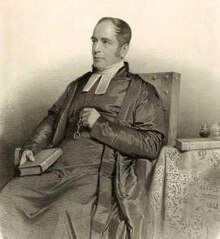Gorham decision
|
The Reverend George Cornelius Gorham |
|
|---|---|

Gorham in 1850
|
|
| Born |
21 August 1787 St Neots, England |
| Died | 19 June 1857 (aged 69) Brampford Speke, England |
| Alma mater | Queens' College, Cambridge |
| Religion | Christianity (Anglican) |
| Church | Church of England |
| Ordained |
|
|
Offices held
|
|
George Cornelius Gorham (1787–1857) was a vicar in the Church of England. His legal recourse to being denied a certain post, subsequently taken to a secular court, caused great controversy.
George Cornelius Gorham was born on 21 August 1787 in St Neots, Huntingdonshire, to Mary (née Greame) and George James Gorham. He entered Queens' College, Cambridge, in 1805, graduating with a Bachelor of Arts degree as third wrangler and Smith's prizeman in 1809.
He was ordained as a deacon on 10 March 1811, despite the misgivings of the Bishop of Ely, Thomas Dampier, who found Gorham's views at odds with Anglican doctrine. Gorham's views on baptism had caused comment, particularly his contention that by baptism infants do not become members of Christ and the children of God. After being ordained as a priest on 23 February 1912 and serving as a curate in several parishes, he was instituted as vicar of St Just in Penwith by Henry Phillpotts, Bishop of Exeter, in 1846.
In 1847 Gorham was presented by the Earl of Cottenham, the Lord Chancellor, to the vicarage of Brampford Speke, a parish in a small Devon village near Exeter, which has a parish church dedicated to Saint Peter. Upon examining him, Bishop Henry Phillpotts took exception to Gorham's view that baptismal regeneration was conditional and dependent upon a later personal adoption of promises made. The bishop found Gorham's view of baptism to be Calvinistic, making him unsuitable for the post. Gorham appealed to the ecclesiastical Court of Arches to compel the bishop to institute him but the court confirmed the bishop's decision and awarded costs against Gorham.
...
Wikipedia
